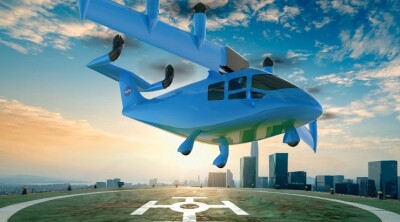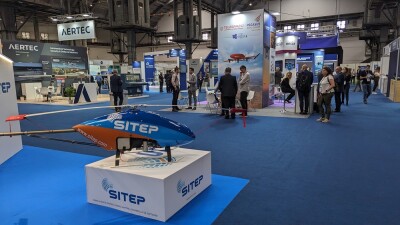Bulgaria's commercial drone market is experiencing significant growth, with revenue reaching approximately $4.4 million in 2024. Furthermore, according to Statista, projections indicate a compound annual growth rate (CAGR) of 7.95% from 2024 to 2029.
In 2022, Bulgaria became the first country in the Balkans to develop an exhibition brand, Inter Drone Expo, dedicated to drones and unmanned aerial vehicles. Moreover, in May 2023, Dronamics, a Bulgaria-based company, made history after performing a successful flight of the first full-scale cargo drone, the Black Swan. The fixed-wing remotely piloted aircraft can carry 350 kilograms of cargo, the same as a small delivery van, and has a range of around 1550 miles, enough to connect most of Europe.
Continuing our UAVs Across Europe series, the following case studies represent how drone technology is used across Bulgaria.
Mapping Flood-Affected Regions
In September 2023, the coastal municipality of Tsarevo, Bulgaria, experienced devastating flash floods that claimed four lives and caused severe damage. A state of disaster was declared as buildings were submerged, bridges collapsed, and water levels rose to two meters in some areas. Access to affected zones was highly challenging, prompting the need for immediate and innovative solutions.
The Bulgarian Ministry of Environment and Water enlisted Sofia University St. Kliment Ohridski’s Center for Geospatial Research and Technology to map the flood-stricken region. Using an AgEagle’s eBeeX drone, the team was able to gather detailed and precise data quickly over large areas. Equipped with RGB cameras and operating in an RTK multi-drone mission, the drones mapped two riverbeds and the affected zones in just 50 minutes. This data was then processed using Pix4D software, completing the entire operation, from data collection to analysis, in a single day.
The 2D orthomosaics and 3D elevation models generated from the drone data were instrumental in recovery efforts, such as locating submerged cars, assessing damage, identifying hazardous areas, and planning reconstruction efforts. This swift response showcases how advanced drone technology can play a vital role in disaster management, enabling authorities to make informed decisions and accelerate recovery in the wake of natural disasters.
Installing Bird Diverters with Drones
In late 2023, Bulgarian conservationists and power company Elektrorazpredelenie Yug EAD made history by using drones to install bird safety markers, called diverters, on a 20 kV power line near Mandra Dam in Burgas. This marked the first drone-assisted installation of its kind in Bulgaria, part of the LIFE Safe Grid for Burgas initiative co-funded by the EU’s LIFE program.
The project focuses on protecting birds along the Via Pontica migration route, one of Europe’s largest, which spans key wetlands in the NATURA 2000 network, including Atanasovsko Lake, Burgas Lake, and Pomorie Lake. These areas are vital habitats for many species, including endangered Dalmatians and Great White Pelicans that often collide with power lines, leading to fatalities.
The initiative aims to install 2,000 diverters between 2024 and 2025, prioritizing hard-to-reach areas like wetlands. It builds on previous efforts in the region, where over 1,350 poles have been fitted with protective insulation since 2021. Future plans include replacing four overhead power lines in Burgas' Sarafovo district with underground cables, enhancing both power supply and bird safety.
This innovative approach not only reduces bird mortality but also contributes to broader conservation efforts under the Pelican Way of LIFE program, dedicated to safeguarding Dalmatian pelicans and other waterfowl species.
The use of drones has proven effective for installing diverters in challenging environments, setting a precedent for future conservation projects.
The First Legal Framework for Drone Spraying
In February, Bulgaria’s National Assembly approved a legal framework for using drones in agriculture, positioning the country as a leader in the European Union alongside innovators like Switzerland and Japan. The amendments to the Plant Protection Act aim to accelerate technological advancements in agriculture, enhancing competitiveness, according to Ivo Kumanov, executive director of NIK Group.
While drone use in Bulgaria is well-regulated under the Civil Aviation Act, the spraying of pesticides and plant protection products with drones has been a gray area - neither explicitly allowed nor prohibited. The new regulations provide clarity, enabling farmers to use drones for spraying while meeting strict requirements from the Bulgarian Food Safety Agency regarding pesticide application records.
Beekeepers, who initially opposed it due to concerns over pesticides, now support drone use after learning it enables nighttime spraying, reducing risks to bees. This practice also helps farmers address labor shortages.
















Comments